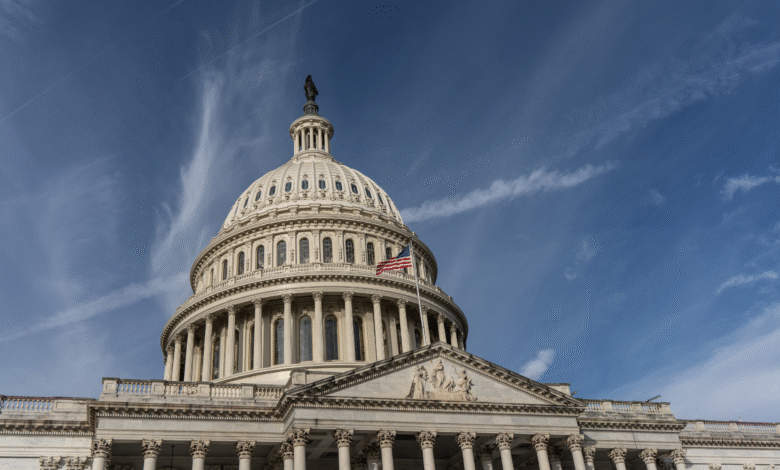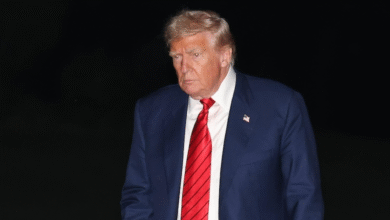War Powers Act: Mike Johnson Argues Its Unconstitutionality

The War Powers Act plays a crucial role in the ongoing debate over presidential military authority in the United States. Recently, House Speaker Mike Johnson, R-La., adamantly declared the Act unconstitutional, arguing that it restricts the president’s ability to engage in military actions without Congress’s approval. This discussion gained urgency following President Trump’s strikes on Iranian nuclear targets, which Johnson believes were justified under Article 2 of the Constitution. He contends that historical precedents show past presidents have conducted military operations without needing explicit consent from Congress. Johnson’s remarks highlight a broader conversation about the balance of power and the legislative branch’s declining role in declaring war since World War II.
In discussions surrounding military engagement and executive powers, the War Powers Resolution is often at the forefront of debate. This legislation, enacted in the wake of Vietnam, attempts to regulate the extent of presidential military authority, but many criticize it as being an unconstitutional constraint. Figures like House Speaker Mike Johnson have emphasized the significance of the commander-in-chief’s role while highlighting the legislative branch’s failure to formally declare conflicts in recent decades. The situation is further complicated by recent military actions, such as Trump’s strikes on Iran, which have reignited discussions on whether Congress sufficiently exercises its constitutional powers. As the conversation continues, the implications of the War Powers Act and its interpretation will undoubtedly shape future presidential decisions regarding military intervention.
Understanding the War Powers Act: A Constitutional Debate
The War Powers Act of 1973 has long been a focal point of contention between the legislative and executive branches of the U.S. government. House Speaker Mike Johnson argues that this legislation is unconstitutional, asserting that it undermines the president’s authority granted under Article 2 of the Constitution. This article explicitly designates the president as the commander-in-chief of the armed forces, enabling them to make critical military decisions, including those related to strikes on foreign targets like the recent action against Iranian nuclear facilities ordered by Trump.
Supporters of the War Powers Act believe it serves as a necessary check on presidential military authority, ensuring that Congress retains its prerogative to declare war. However, Johnson and many constitutional scholars contend that the Act infringes upon the executive branch’s powers. They argue that previous administrations have engaged in military actions without requiring prior congressional authorization, setting a precedent that distances itself from the limitations imposed by the War Powers Resolution.
Military Authority: The Role of Congress and the President
The complex relationship between military authority and the roles of Congress and the president is a critical aspect of U.S. governance. According to Johnson, the legislative branch has not effectively used its power to declare war since World War II, allowing presidents significant leeway in military engagements. This ongoing trend raises important questions about the scope of presidential powers and the necessity of congressional oversight when it comes to military operations.
Johnson emphasized that President Trump’s recent strikes against Iran were a proper exercise of executive powers. He believes that Congress or the courts are unlikely to restrict Trump’s authority in this regard. This situation exemplifies the ongoing debate surrounding the balance of power in national defense matters, where the executive branch often acts swiftly, while Congress appears more hesitant to intervene, further complicating the constitutional balance intended by the framers of the Constitution.
Johnson’s remarks came in the context of a proposed resolution by Rep. Thomas Massie and Democratic Rep. Ro Khanna aimed at prohibiting unauthorized military actions in Iran. Johnson’s skepticism about the resolution’s fate highlights the broader struggle within Congress to assert its constitutional role in declaring war versus the reality of presidential military authority.
The Implications of Trump’s Military Decisions
President Trump’s unilateral decision to conduct strikes on Iran’s nuclear targets captured substantial attention and sparked renewed discussions about the limits of the War Powers Act. House Speaker Mike Johnson’s endorsement of Trump’s actions underscores a significant shift in the justification for military engagement. Johnson articulates that military decisions should rest predominantly with the commander-in-chief, allowing for quick and decisive action without prolonged deliberation in Congress.
Yet, this reliance on presidential discretion carries implications regarding accountability and oversight. Critics of the executive’s military authority argue that unchecked presidential actions could lead to conflicts without proper legislative debate. Johnson, while supporting Trump’s capability to operate under Article 2, acknowledges the importance of reviews such as those from constitutional experts who highlight the need for a balanced approach to power, exemplifying the fraught and often contentious relationship between military governance and legislative authority.
The Historical Context of the War Powers Resolution
The War Powers Resolution emerged in 1973, crafted in response to U.S. military actions in Vietnam without congressional consent. It aimed to curtail the potential for presidential overreach during military engagements, mandating the president to inform Congress within 48 hours of deploying armed forces and requiring a formal declaration of war to engage in hostilities beyond a 60-day period.
Despite its intentions, the effectiveness of the War Powers Resolution has often been questioned, as shown by Michael Johnson’s assertion that previous presidents have sidestepped its requirements. This historical context provides a necessary backdrop for understanding the current debates on military authority and congressional involvement. The ongoing challenge lies in finding a functional equilibrium between promoting national security and abiding by constitutional principles that require checks on executive power.
The Continued Relevance of Congressional War Declarations
The importance of Congress’s role in declaring war remains a significant discussion point in U.S. legislative and military affairs. Historically, the power to declare war was vested in Congress to ensure a democratic process in matters of life and death. However, House Speaker Mike Johnson highlights that Congress has not exercised this power effectively since World War II, with an increasing reliance on executive action to engage in international conflicts.
This lack of congressional declarations poses a concern for the integrity of the War Powers Act and threatens the system of checks and balances that underpins U.S. governance. As military conflicts evolve and become more complex, the latitude afforded to presidents may require reevaluation to ensure that both branches operate within their defined constitutional roles.
Impacts of the War Powers Act on National Security Policy
The War Powers Act has significantly influenced national security policy, often intertwining with contemporary issues such as military engagements in the Middle East. Johnson’s comments about Trump’s strikes against Iran illustrate the contemporary debate surrounding military authority and the need for swift action to safeguard national interests. Many argue that a weakened War Powers Resolution could hinder effective responses to emerging threats.
As the geopolitical landscape continues to evolve, the War Powers Act’s implications regarding military readiness and preemptive actions become increasingly crucial. Policymakers must navigate the delicate balance between ensuring military efficacy and adhering to bipartisan legislative procedures, which potentially impacts the ability to respond promptly to threats against national security.
The Debate Over Presidential Powers in Military Action
The debate surrounding presidential powers in military action often reflects deep-seated divisions in political ideology. Supporters of a strong executive argue that decisive action is necessary in a volatile global environment, as seen in Mike Johnson’s defense of Trump’s strikes on Iran. They contend that long consultation periods could jeopardize strategic advantages and take away from the president’s role as commander-in-chief.
On the other hand, critics argue that allowing presidents such autonomy without congressional input risks leading to unnecessary military conflicts. Johnson’s stance on the War Powers Act portrays an evolving perspective on presidential military authority and encapsulates the ongoing struggle to find adequate checks on power while also empowering leadership during periods of heightened conflict.
Legislative Responses to Military Incursions
Legislative responses to military incursions continue to play a crucial role in shaping U.S. military policy. Despite Mike Johnson’s predictions about the failure of initiatives like the resolution introduced by Rep. Massie and Rep. Khanna to ban unauthorized military activity in Iran, such proposals indicate a growing concern among lawmakers over the need for a more collaborative approach to military decisions.
These responses are indicative of a broader recognition of the need to re-establish Congressional authority in military matters. As the nature of warfare evolves, maintaining a framework where legislative oversight complements executive action is vital for ensuring accountability and transparency in U.S. military engagements.
Reassessing the War Powers Act’s Constitutionality
The constitutionality of the War Powers Act remains a contentious issue among scholars, legislators, and political commentators. Johnson’s assertion that the Act undermines presidential authority raises critical questions about its legitimacy in the context of the evolving nature of warfare. By highlighting the inherent conflict between the Act and the powers vested in the president by Article 2, dissenters emphasize the need for reevaluation of existing legal frameworks governing military action.
A reexamination of the War Powers Act could lead to significant changes in how military authority is perceived and exercised. As Presidents, such as Trump, engage in strategic military decisions that may fall outside traditional engagement, the discourse surrounding constitutional constraints will shape future policies and legislative actions, ensuring that the fundamental balance of power remains intact.
Frequently Asked Questions
What is the War Powers Act and its significance in military authority?
The War Powers Act, enacted in 1973, limits the President’s ability to engage U.S. forces in military action without congressional approval. It requires the President to notify Congress within 48 hours of deploying troops. The Act aims to balance military authority between the President and Congress, ensuring that any military engagement is justified and monitored by elected representatives.
How does House Speaker Mike Johnson view the War Powers Act?
House Speaker Mike Johnson argues that the War Powers Act is unconstitutional, contending that it infringes upon the President’s Article 2 powers, which grant military authority and the role of commander-in-chief. He believes that previous presidents, including Donald Trump, have effectively acted within their constitutional rights to order military actions without congressional approval.
What was the context of Trump’s military strikes in Iran related to the War Powers Act?
The context involves President Trump’s decision to conduct military strikes on Iranian nuclear targets, which Speaker Mike Johnson asserted was in line with presidential powers under Article 2 of the Constitution. Johnson emphasized that these actions should not be constrained by the War Powers Act, which he considers unconstitutional.
What concerns were raised regarding the congressional response to unauthorized hostilities in Iran?
There are concerns regarding a resolution proposed by Rep. Thomas Massie and Rep. Ro Khanna that seeks to ban unauthorized hostilities in Iran. Speaker Mike Johnson expressed skepticism about its chances of passing in the House, highlighting the historical context where Congress has not declared war since World War II and suggesting that the legislative branch is reluctant to utilize its power in matters of military authority.
Why hasn’t Congress declared war since World War II, and how does it relate to the War Powers Act?
Since World War II, Congress has not formally declared war, which raises questions about its engagement in military matters. This non-action can be partly attributed to the War Powers Act, which provides a legal framework for presidents to engage in military operations without needing formal declarations of war, thus contributing to a shift in military authority towards the executive branch.
What is the role of constitutional scholars regarding the War Powers Act?
Many constitutional scholars believe that the War Powers Act conflicts with Article 2 of the Constitution, which outlines the President’s military authority. They argue that the Act encroaches on the President’s power as commander-in-chief, impacting how military actions are conducted and justified without congressional oversight.
What is Speaker Johnson’s stance on military operations without congressional oversight?
Speaker Johnson is in favor of the President maintaining military authority to act without congressional oversight. He believes this approach is essential for national security and that unnecessary constraints from the War Powers Act can hinder the effectiveness of U.S. military operations.
How does the War Powers Act affect the relationship between Congress and the President?
The War Powers Act is designed to create a system of checks and balances between Congress and the President regarding military engagements. However, as noted by critics like Mike Johnson, it may lead to constitutional conflicts over military authority, with some arguing that it restricts the President’s ability to respond quickly to international threats.
| Key Point | Details |
|---|---|
| Constitutionality of the War Powers Act | Mike Johnson argues the Act, which restricts presidential war powers, is unconstitutional. |
| Presidential Authority | He claims Trump’s strikes on Iranian targets align with presidential powers under Article 2 of the Constitution. |
| Historical Context | Previous presidents have engaged in military actions without congressional approval, indicating a precedent. |
| War Powers Resolution of 1973 | The Act requires the president to notify Congress within 48 hours but has seen doubts regarding enforcement. |
| Skepticism on Congressional Resolutions | Johnson expresses doubt on the resolution to ban unauthorized hostilities in Iran passing in the House. |
| Impact of War Declaration | Legislative action to declare war has been non-existent since WWII, emphasizing presidential military authority. |
| Final Remarks | Johnson believes invoking the resolution would not be a proper use of the law. |
Summary
The War Powers Act is often a contentious topic in U.S. politics, as evidenced by House Speaker Mike Johnson’s recent arguments claiming its unconstitutionality. Johnson maintains that the Act limits the president’s powers to conduct military actions, a claim that is debated among constitutional scholars. He asserts that recent actions by President Trump to order strikes against Iran were well within his constitutional rights. Despite the current legislative framework aimed at regulating military engagement, such as the War Powers Resolution of 1973, its recent effectiveness is in question. Johnson’s perspective highlights a significant divide in opinions on presidential authority and congressional power regarding the declaration of war, a discussion that remains relevant in the context of ongoing global conflicts.




